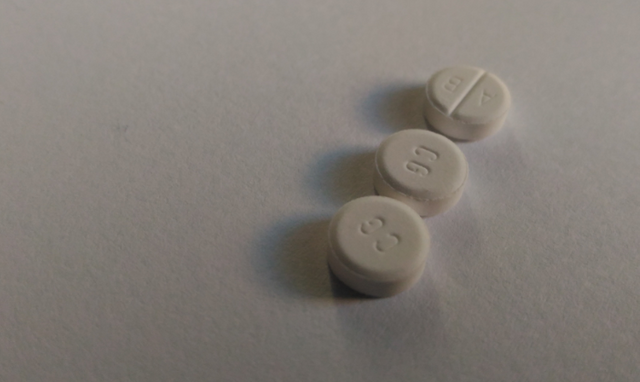[neuro-hacking] How your friend dopamine affects your focus and satisfaction with life
In this article I want to distinguish between being ENTP / ENFP (mbti types), having ADD / ADHD and a dysfunctional reward (dopamine) system and possible external factors that could be at the bottom of all of this. Also we will take a look at the ways how to help the crippled dopamine system and find more satisfaction in life through neuro-hacking.
Hyperactivity condenses to having way too much unused potential. The energy is like a limitless battery and the charge is constantly skipping over to different things, like a lighting in a cloud.
That is why hyperactive people get extremely hyperactive when drunk – the filters that had been holding the energy at bay to some extent, are gone. All of the potential has to be expressed now and it is done so with the full force.
And as a ENTP myself, I tend to obsess with ideas, I see context in everything and I create connections between anything (right now my brain is thinking how could I map the previous sentence to the forming of the new neurons in my brain and come up with a new theory about Hindu concept of tat tvam asi); I disregard useless things like keeping things clean (well, I only ever clean them when there is no other option or it becomes a serious nag – that is the first symptom that you want to remember):
ENTP people only ever do things, when there is a serious “kick” in it.
And knowing how dopamine system works, that could very well mean that we have very little dopamine receptors in our prefrontal cortex OR that we have little dopamine. Either way, the reward system is broken. As is in ADHD individuals.
Another “high kick” things is extreme humor. For me personally it’s Louis CK (rape jokes etc.), Bill Burr (……), Jimmy Carr (comebacks that burn) and more. Stimulating movies for me are Tarantino movies, Matrix, Fight Club etc. All of this is quite extreme, and I noticed it lately when the people at a wedding I attended did not laugh at the best jokes I knew – they were accustomed to a mild humor, and not ready for extremities (they were same age and drunk the same as I was, the context of the situation was alright.)
Also, ever since I can remember, I liked to argue. Then it was probably low self esteem coupled with a presumably high intellect. I would one up people to get that dopamine spike, that felt so good.
ENTP people are also not very emotional, recently I read a funny but true description of all of our emotions: depressed, meh, awesome. A recent discovery lead me to believe the emotions have to do with the dopamine system also.
On hyperactivity
People with ADHD have problems focusing their attention. They tend to skip between a number of tasks. They, and maybe we, are like puppies who are over-stimulated with the world and don’t know what to do first. I may not be objective here, because the symptoms for ADHD and being ENTP kind of melted together for me – for example having a laser focus when you are driven – in that “obsessed” mode. Just when something catches my attention that is seriously interesting, or it has some big potential rewards – then I don’t do anything, ANYTHING, else and I focus only on that thing with insane amount of focus. I think that ADHD people have it the same. It is only when the task is rather dull and there is no instant gratification, then we tend to abandon the task.
Symptom:
If the task is not immediately rewarding, then ADHD people abandon it and do something else.
So, i.e. school, working at a job that is not congruent with our life’s purpose (well, for those who found it already…) … yeah, mostly those two – school and work. We will look into that in the last chapter more.
But being ADHD for me means that people get easily distracted. Especially, when they have a very boring task to do. Then, our minds generate a million of revolutionary ideas that we can’t help but to get to doing right now. Or, for me it’s sounds. If I am studying some useless thing, like Theoretical Informatics (not boasting, I seriously hated that thing – I will never build compilers or care about Turing completeness in algorithms) – and my friend in the room starts chewing or typing… or another friend in another room starts talking too loud. Then I get distracted and can’t focus at all. So small things are enough!!
Symptom: Being distracted by small stimuli
That changes or ritalin, or after I meditated for a few days.
Ritalin makes ADHD people calm and focused, almost unable to distract them from the task at hand (well, we could argue). I once sat for 6 hours reading about network protocols for an exam, without moving or eating. But then, everything becomes a thousand times more interesting on ritalin. So, if Facebook is like a nice cake, it’s like heroin when you are on ritalin. If studying something that you hate is like stinky shit, on ritalin it feels like a chocolate muffin.

On it your ideas also start flowing like crazy, but now you have the will to actually go through. In some scientific tests they determined that one of the things that ritalin does is to make you pursue the task for longer time before you give up.
It works on modulation of the dopamine re-uptake inhibitors, and IIRC, there is a chemical compound that gets rid of dopamine in your brain after it has been used – only now that compound is inhibited, so the dopamine is continued to be used – therefore you feel rewarded way way more for something that you do.
But normal people who take ritalin do not experience it the same way, at least that is what I read, no experience with that. They get even more distracted and hyperactive when on ritalin. So a pseudo-way to see if you are ADHD is to take ritalin and see if it calms you down or amps you up.
Hyperactivity condenses to having way too much unused potential. The energy is like a limitless battery and the charge is constantly to ping over to different things, like a lighting in a cloud.
That is why hyperactive people get extremely hyperactive when drunk – the filters that had been holding the energy at bay to some extent, are gone. All of the potential has to be expressed now and it is done so with the full force.
That is why it first shows at school, especially if the kid is clever. The study material being taught is not stimulating enough, so the kid has no option than to express their life energy in a different way, like running or doing silly things. And for that they are being punished, from the teachers and from their parents. Which may drug ‘em up with Ritalin or Adderal, making the problem worse. A monstrous act. Fruit of our “perfect” system is brain-raping children who have potential to be something more and telling them they are dysfunctional and not normal. FUCK THE NORM.
On the Dopamine System
Dopamine is the chemical that is responsible for the feeling of “being rewarded”. It is a catecholamine, which are derived from tyrosine (we talk about that later). Catecholamines are generally responsible for hunger signaling - when you have a lot of catecholamines in your system, you feel hungry less. Thus when a lot of dopamine floods your system, you also feel less hungry. That may be a problem - when you can spend 8 hours playing a PC game and you seriously do not feel any hunger, because you have your brain bombarded with stimuli => dopamine.
A problem occurs when you have too many rewards for not doing anything (i.e. masturbation, playing games, watching Game of Thrones, listening to music, eating sugar, drinking coffee…) - so low effort, high reward. Then your brain adapts to it, and it no longer accepts anything that is high effort and low immediate reward, like studying or paying the bills. In your brain’s “priority list” those tasks get shoved literally to the bottom.
The reward system controls everything. If you don’t feel rewarded for doing something then you just don’t like doing it, that is simple biology.

Dopamine is also important in emotion processing. Now I still have not found if it is (A) having too few dopamine receptors or (B) having too little dopamine available. But either way, if you have A or B, you feel emotions less. That would explain the dull emotions of an ENTP.
Now I am thinking about the connection to studying and being distracted by sounds. I think it is that studying is very low reward and therefore any external stimulus that is only a bit higher in stimulation (sound, voice) overtakes the system. That would point to the option A.
One thing you could do to help your dopamine system is to go through a dopamine challenge. For one month, do not do anything rewarding that is not productive. No music, no movies, no YOUTUBE, no reddit, no games, no masturbation, no sex…. Just dull your life down. Then the brain dopamine receptors start to grow again (or come out of their shells one could say, pseudo-science I know) and you would feel rewarded for then boring tasks.
Another way is to shoot yourself in the foot, with ritalin. Ritalin only hides the symptoms, does not heal the underlying cause. It only makes it worse for you, by stopping you to feel the negative effects this “condition” has on your life.
L-Tyrosin is a good alternative. It is a supplement, a precursor from which is the dopamine created in the body. I am not sure if it can cross the hematoencefalic barrier (blood/brain), but the L- in the front hints as much. You need the B6 vitamin for it to work tho – it acts as a bottleneck. If you don’t have enough B6, you can’t use the tyrosin properly. Spirulina is an awesome source of B6. So if you chug a glass of spirulina potion in the morning, and take 1g of L-tyrosine at noon, you should feel some effects.
Coffee also helps the dopamine system, but a crash comes after. Also it messes up your stomach acids, effectively crippling your digestive system, which in turn harms your brain in the long term – because the body adapts to the elevated acid in your stomach and starts creating less of it. When it creates less of it, your digestion gets worse => undigested food in the large intestine => leaking through the gut into your body => liver has to take care of it => filtering toxins creates bilirubin which slows your neural pathways.
A great alternative to coffee is Matcha tea. It contains both caffeine and L-theanine, which carry each other to greater lengths. And they don’t crash!! Matcha tea is a form of green tea, which is about 5 times more potent than normal green tea. You can also buy only the L-theanine supplement and safeguard yourself from the coffee crash with it, but I don’t recommend it for the reasons above (coffee/caffeine).
A good enhancement of matcha is also Rhodiola Rosea, a Himalayan root that coupled with matcha tea made wonders for me. Sometimes it even felt like ritalin.
Of course, physical activity is one of the most effective dopamine system renewal methods. You are evolutionary wired to be a hunter, thus to enjoy physical activity (after some startup period of suck). Imagine your dopamine receptors like little diglets hidden in their comfortable huts… and just SHOCK those fuckers out. Same goes with cold showers – just willingly step out of your comfort zone, and the hidden and cowardly receptors will step out of their comfy homes, and you will start to feel the life more.
Meditation is another awesome way to fix your broken dopamine receptors. Maybe the second most effective after physical activity. Check out how for example in this comprehensive article On How to Meditate. It has been by far the most valuable skill I have ever incorporated into my life.
On the Mind-Body connection and psychological aspects
Now let’s dive into the psychosomatic aspect of the dopamine system, as every illness has a psychological factor or a cause.
Recently I read a very interesting thought about the dopamine receptors being modulated by real life circumstances.
See, if you have very little rewards in your life, or you are doing something that you hate (therefore you have no rewards from it) – be it school, your job, or living in the system…. Then your body adapts. Your DNA is constantly changing, and if your brain sees that you do not get any big rewards, why would it keep the reward system depleting the energy it can use elsewhere?
That would be also congruent with my experience. I studied (study) a college that I hated for about 6 years, only so I can have a “certification”, a paper proving that I am something. But that paper is only a ticket to a life in the system – working a 9/5 job, slowly dying, coping not thriving. Then at 30 making kids that will only again take your energy and make your life miserable. And then, finally at 65 when your kids are mature and you no longer need to work, you get your small pension and you can finally do everything you ever wanted to do. Except – now you can’t anymore.
If you know all of this, why would the brain be excited for life? How could it be.

You would need to go through some pretty drastic changes to revert this way of thinking and make yourself to enjoy life. And make the dopamine receptors grow again – they will starts to grow in proportion to how much you are enjoying your life.
Conclusion
The inability to focus, dullness of life and feeling emotionless will go away if you start doing what you want in life, like become an entrepreneur and travel a lot (well, a digital nomad), divorce yourself from the system and start living on your own, through taking a lot of successful risks – then your dopamine receptors will start to grow like mushrooms after rain, and you will feel the rewards of life in their full glory.
P.S. If you have the time, feel free to check out the awesome movie about ADHD, called Mommy (2014). Prepare to feel.
I upvote your post and do same